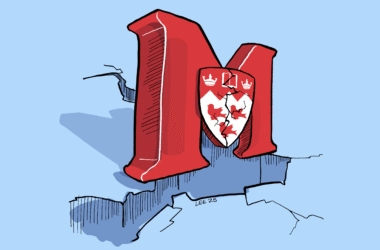
MT: How did it feel to win the CIS championship?
EV: It’s a great feeling. The way things happened in terms of the history of the franchise, the program-which is 136 years old-not winning after what we went through last year in terms of losing in the finals, and then to win it in the fashion that we did, in overtime, on the 50th edition of the University Cup, it was really something special for us.
MT: How did the team react when Western scored that tying goal in the third? What was going through your minds?
EV: They scored the tying goal 30 seconds into a five-minute powerplay and I was thinking, “Okay, this is something we’re going to have to dig out of.” But, we have such a character group of guys that nobody got too frustrated, panic didn’t set in, and in the remaining four and a half minutes of the powerplay, we only let by one shot. I think it shows how determined the guys were, and the sacrifices they were willing to make.
MT: How did it feel to score the winning goal in overtime?
EV: Having that puck go in, I was ecstatic, but it was also so much more for me. Beyond making program history, I don’t know if many people know, but Picard-Hooper, who gave me the pass on the tying goal, his assist set the all-time point record at McGill. There’s just so much stuff that happened in that one play that has such an impact on the school, the team, and all of our lives.
MT: What will happen to your hockey career now that you’re graduating?
EV: I want to play professionally, probably in North America, so I’m going to look at my options during the summer and, come fall, hopefully I’ll have something to do. If not, I would definitely consider Europe as an option. In the end, if it doesn’t work out, yeah I’ll be disappointed, but hey, I have a degree, and hockey has been so good to me that I have no regrets whatsoever.
MT: What do you think of the Redmen coaching staff?
EV: Since he joined the team two years ago, [Head Coach] Kelly Nobes has been a great addition for us. We’ve had exceptional coaching all five years that I’ve been here. Really, our success the last three years has been thanks to [ex-Head Coach] Martin Raymond’s recruiting, and then Jim Webster [came] in for a year and we lead the nation in scoring that year. Then Kelly [came] in, and we lead in scoring again and win the championship.
MT: As team captain, how much responsibility do you take for your team’s successes and failures?
EV: For me, being a leader is leading by example. It means putting in hard work, but that’s what our team is based around. I don’t have to show the guys the way, the guys show each other the way. And that’s something I noticed when I got to McGill; it’s something that’s instilled within the program, and it’s still being instilled into the young guys that are coming in.
MT: How do you think the team will respond next season, considering that the team loses eight players this summer?
EV: There are a lot of the first years that got a lot of experience this year because of injuries, so they have a solid base to work with next year. They have most of the defensive core coming back, as well as all the goaltenders, and winning the CIS championship is a huge recruiting tool. So I think they have a solid team coming into next year.
MT: Take us through your typical game day.
EV: Usually, I’ll meet up with Andrew Wright at 9:30 at Cora’s for breakfast. Honestly, I’m not much of a class goer on game days, so I usually have a bowl of soup around noon and follow that with a nap for an hour and a half in the afternoon. Then I’ll get up towards three, eat my pre-game meal, hop into the shower, and get out of my apartment by four. Then it’s down to Second Cup for a coffee and off to the rink. We always have a meeting an hour and a half before the game with the coach, and then we warm up and play. After the game, I usually hang out with the guys, get something to eat and then go to bed.
MT: Who’s your favorite hockey player/team?
EV: I’m a Habs fan, and have been since I can remember. I have to say, especially when I was growing up, my hockey role model was definitely Jerome Iginla. I really enjoy the way he plays and the hard work he puts into his game.
MT: Do you think fighting should be taken out of hockey?
EV: I don’t think you can completely remove fighting because there will be stick swinging incidents, dirty elbows, hits to the head, which have been so popular lately, and I have no problem with a guy going after another guy for a cheap shot. If you’re going to do something like that, and put someone else’s health at risk, I think there’s a price you have to pay.






